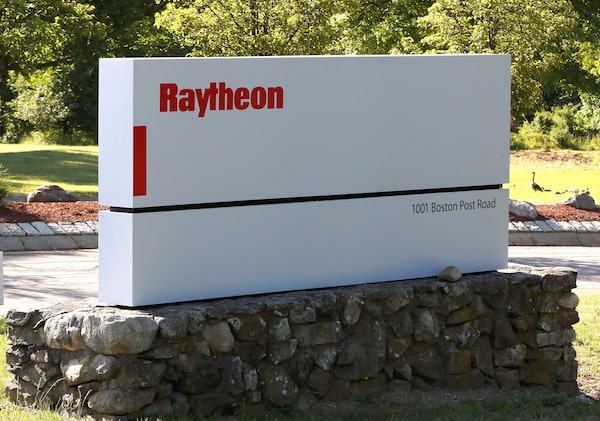
A sign stands at the road leading to the Raytheon facility June 10, 2019, in Marlborough, Mass.Bill Sikes/The Associated Press
U.S. President Donald Trump said on Monday he was a “little concerned” about the merger of defense contractor Raytheon Co and United Technologies Corp but gave a mixed message as to whether he believed the $121 billion deal should go forward.
“I want to see that we don’t hurt our competition,” Trump said in an interview with CNBC. “I hope the Raytheon deal, I hope it can happen. But I don’t want to see where we have one less person that can compete for an order.”
The merger, announced on Sunday and expected to close in the first half of 2020, would potentially upend the aerospace sector, creating a conglomerate spanning commercial aviation and defense procurement. The Pentagon would be one of the new company’s largest customers.
“When I hear they’re merging, does that take away more competition?” Trump said. “It becomes one big, fat, beautiful company, but I have to negotiate, meaning the United States has to buy things, and does that make it less competitive? Because ... it’s already non-competitive.”
Shares of Raytheon rose 1.4 per cent at mid-afternoon. United Technologies fell almost 2 per cent.
United Technologies Chief Executive Greg Hayes said he saw very few regulatory hurdles for the proposed merger. Asked about Trump’s views on the deal, he said he would talk to the president later on Monday.
The deal will be reviewed by either the Justice Department or the Federal Trade Commission to ensure that it complies with antitrust law.
The companies, despite their broad range of products, do not overlap in many markets. United Technologies provides plane makers with electronics, communications and other equipment, while Raytheon primarily supplies the U.S. government with military aircraft and missile equipment.
Because of this, they will likely propose a package of asset sales to resolve regulatory concerns about loss of direct competition in the few areas where they do overlap, according to two antitrust experts who spoke on condition of anonymity.
The Defense Department and big customers like Boeing Co , Lockheed Martin Corp and Northrop Grumman Corp will have a lot of clout in the antitrust review, and may worry about over-reliance on one company for a big suite of products.
“One firm will now own the engine and the radar and some other capabilities on a platform like the F-35, and what the implications of that are for customers – that may be reviewed as well,” said Jeff Bialos, a partner at Eversheds Sutherland LLP and a former deputy under secretary of defense for industrial affairs.
Executives at big defense contractors are analyzing how the deal would affect their costs, one executive said on condition of anonymity. Boeing has already said that it was looking at the proposed deal.
In Northrop Grumman’s purchase of Orbital ATK last year, the FTC noted in a statement accompanying the approval that it worked closely with the Defense Department on the review, and had the department appoint someone to oversee compliance of the consent decree.
One potential snag is that Patrick Shanahan, a former Boeing executive, is now acting secretary of defense. He has recused himself from dealings involving Boeing, which uses United Technologies products such as engines from its Pratt & Whitney engines division.
This could complicate Boeing’s position if it opposes the merger, the unidentified industry executive said, noting that lower level Department of Defense officials with potentially less clout would have to review the deal.